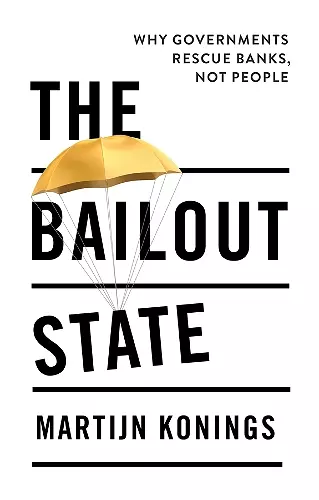The Bailout State
Why Governments Rescue Banks, Not People
Format:Hardback
Publisher:John Wiley and Sons Ltd
Published:25th Oct '24
Should be back in stock very soon
This hardback is available in another edition too:
- Paperback£15.99(9781509564323)

How did we end up in a world where social programs are routinely cut in the name of market discipline and fiscal austerity, yet large banks get bailed out whenever they get into trouble?
In The Bailout State, Martijn Konings exposes the inner workings of this sprawling infrastructure of government guarantees. Backstopping financial markets and securing banks’ balance sheets, this contemporary Leviathan manages the inflationary pressures that its generosity produces by tightening the financial screws on the rest of the population.
To a large extent, the bailout state was built by progressives seeking to buttress the institutions of the early postwar period. The resulting tide of capital gains fostered an asset-centered politics that experienced its heyday in the nineties. But ever since the financial crisis of 2007-08, promises of inclusive economic growth have looked increasingly thin. A colossus locked in place, the bailout state disburses its benefits to a rapidly shrinking group of property owners. Against the backdrop of a ferocious post-pandemic turn to anti-inflationary policy, the only remaining way to exit the logic of the bailout, Konings argues, is to challenge the monetary drivers at the heart of capitalist society.
“Konings has penned an essential telling of the decades of evolving economic ideology that enshrined vast rights and backstops for Wall Street while ordinary Americans were left to wither on the vine. The Bailout State lifts the veil on how the never-ending logic of bailouts and too-big-to-fail ate our entire political economy.”
Krystal Ball, host of Breaking Points and author of The Populist’s Guide to 2020
“Martijn Konings is one of the best political economists of his generation. The Bailout State is a thoroughly researched, historically grounded, and highly accessible examination of the relationship between capital and the US state, which takes the reader on a fascinating journey through decades of American imperialism. This book should be required reading on the left and beyond.”
Grace Blakeley, author of Vulture Capitalism: Corporate Crimes, Backdoor Bailouts and the Death of Freedom
“The Bailout State is a brilliant exercise in unmasking. With subtlety and sophistication, Konings cuts through both technical tangles and political mystification to open a path towards making a monetary architecture that spreads rather than concentrates wealth. A must-read for those seeking to understand – and to act on – contemporary capitalism.”
Christine Desan, Harvard University
“In this brilliant, lucidly written book, Konings offers a new understanding of the past in order to ‘re-see’ the present -- and imagine a different future. The Bailout State unpacks the deeply imbricated relation between the state and finance in the modern era and shows how Keynesianism was repurposed to pave the way from the welfare to the wealthfare state.”
Katharina Pistor, Columbia Law School
“Martijn Konings’s The Bailout State offers a bracing and often infuriating account of how we ended up in a world where creditors are routinely offered state bailouts when their investments go south, but debtors and workers are routinely hung out to dry, especially when either inflation rises, or the economy takes a nosedive.”
Nils Gilman, Chief Operating Officer and Executive Vice President at the Berggruen Institute and co-author of Children of a Modest Star/
“Martijn Konings delivers an ultimatum: if we do not confront how we are all both beneficiaries and captives of the bailout state then we are getting nowhere.”
Quinn Slobodian, Boston University
“This brilliant book offers a spellbinding journey through the archives, hopes, and unconsciousness of the contemporary bailout state. What emerges is a Minskyan appreciation of the deep roots of stabilizing an unstable financial system which reveals postwar Keynesianism as a direct precursor to our own impasse. The Bailout State takes us to the very edge of this predicament and helps us see why we are stuck.”
Stefan Eich, Georgetown University
“CEOs pretend their wealth and power comes from self-reliance and entrepreneurship. But whenever things go wrong – as they regularly do – they run to the nanny state for an expensive rescue. In this elegant and timely book, Martijn Konings proves that bank and corporate bailouts are the rule, not the exception, of financialized capitalism. The misuse of massive public resources to save capitalists from themselves is a deeply ingrained tradition. Progressives must understand the nature and workings of the bailout state, in order to imagine and win a different one – and this book will help enormously.”
Jim Stanford, Economist and Director, Centre for Future Work, Vancouver
Nils Peters, London School of Economics
“This book connects dots that desperately need connecting for those who want to understand the crisis of national economic policy and of democratic legitimacy in the world today. Its scathing description of how US government policy has, since the 1970s, tilted toward bailing out privileged sectors – especially politically protected banks and shadow banks – even while falling wages and the rising cost of living hollowed out its income distribution. While the bailout of too-big-to-fail banks in the 2008 crisis is well known, this volume shows how ‘bailout state’ policies have been prominent features of United States policy for the past 40 years.”
Gary Dymski, University of Leeds
ISBN: 9781509564316
Dimensions: 221mm x 142mm x 25mm
Weight: 454g
272 pages